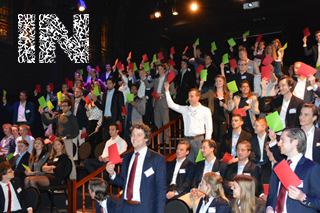In een paar weken tijd nam kunstmatige intelligentie de wereld over op een ongekende manier. Met de lancering van ChatGPT door OpenAI in november


Koos Henning, chairman of the evening, opens the night at Klasse Theater Tilburg. As an economist at the ‘vereniging van effectenbezitters’ he is an expert on Dutch stocks and funds. A man worthy of leading a discussion on investments by some of the leading experts in their respective field. And the discussion quickly starts as the first two speakers discuss active versus passive management.
“Active managed funds will be gone in 25-30 years” – John C Bogle
This is the controversial quote San Lie, head of equity research at Morningstar Benelux, uses to start the evening. A quote by the founder of Vanguard group, an investment management company that manages over $3 trillion in assets. But is he right? According to San Lie he might very well be. An astonishing 99% of recently raised money in the United States is currently flowing in to passively managed funds such as ETF’s. Of course this does not mean active management has died out. Not at all actually, since two third of the total money is still invested in active funds. However passively managed funds are catching up quickly. Very low risk and almost guaranteed performance is the driver behind this. However this trend has only set in in the United States, Europe is lagging behind. In emerging markets actively managed funds are even still leading. But is this necessarily a bad thing?
The second speaker of the evening, Simon van Veen, doesn’t think so. Simon van Veen is a senior portfolio manager for BNP Paribas global high equity fund and the Parvest Europe high dividend equity fund. He claims that by using an ETF you are setting yourself up for guaranteed underperformance. As an active manager for his dividend equity fund he is continuously looking for companies with a history of dividends above 3%. The reasoning behind this fund is that dividends are sticky which makes management more disciplined and that only stable, sustainable companies with large free cash flow can issue this constantly. But as he notes there are pitfalls. Sure Nokia looked stable and sustainable just a few years ago, but who are the leading companies now? Samsung and Apple. And can you determine whether cash flows are truly sustainable? Those of banks sure looked to be, but the recent financial crisis has shown otherwise.
After a short break, Ben Steinebach, head of investment strategies at ABN AMRO MeesPierson, talks about quantitative easing in the United States and Europe. The European economy is moving forward due to the low oil price and quantitative easing in Europe starting March 2015. The United States started this program in 2009 and has seen growth since then. But how should an investor allocate their funds with this in mind? Ben thinks equities are still attractive, suggesting an overweight position in Europe and emerging markets. The improving economic outlook, rallied by QE, and the increasing sentiment in emerging markets should push returns. He also suggests the underweight position in the US equities due to the strong rally of the US market the past few years and the higher P/E ratios compared to the Europe and emerging markets.
Are you a sheep or are you a navy seal?
Hans Betlem, Chief investment officer at IBS Capital Management, asks the audience this question as he starts his discussion on active versus passive management.
“Forget the needle, buy the haystack” – John C Bogle
Another famous quote by the founder of Vanguard. But is he right? He is not according to Hans Betlem. Some people can outperform the index! But only 19% of active managers did so in 2014. You have to be creative as Hans showed us with an example. If you had continuously invested in the 25 lowest ev/ebita stocks in the MSCI world index you would have structurally outperformed the index year after year. As Hans quoted Mark Owen, former navy seal, you have to be comfortable being uncomfortable. An excellent investor has different strategies, the ability to control their emotions and make clear probability weighted investment decisions.
And what we are at Asset | Accounting & Finance? Navy seals of course!






















